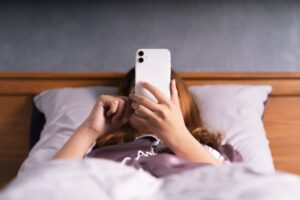
Many people like to take their smartphones with them to bed. They may scroll through social media or check messages for hours before they finally drift off to sleep. While this habit might seem innocent enough, it could actually have a huge impact on the quality of your sleep and your overall health, especially if you have sleep apnea. What is the connection between phones, sleep quality, and sleep apnea? This blog post provides some useful information.
How Smartphones Affect Sleep
Smartphones can influence sleep quality in several ways, two of the most important of which are:
Blue Light Exposure
Smartphone screens emit blue light, which is similar to natural daylight. Exposure to this type of light before bedtime sends signals to the brain that promote alertness. The body responds by suppressing the production of melatonin, the hormone responsible for managing the sleep-wake cycle. With lower melatonin levels, falling asleep becomes more difficult and sleep may become fragmented. This effect can be particularly problematic for individuals who already experience poor sleep quality, including those with sleep apnea.
Mental Stimulation
Checking emails, scrolling through social media feeds, or watching videos on a smartphone activates the mind and increases cognitive activity. Instead of winding down, the brain remains engaged and alert, which delays relaxation and extends the time needed to fall asleep. Notifications or alerts during the night can further interrupt sleep cycles, causing multiple awakenings and reducing the overall quality of your rest.
Special Considerations for Sleep Apnea
Sleep apnea causes repeated interruptions in breathing throughout the night, leading to frequent awakenings and decreased sleep quality. When smartphone use introduces additional disruptions, such as blue light exposure or mental stimulation, the negative effects can become compounded. Indeed, cell phones and sleep apnea can create a combination that totally robs you of high-quality rest!
Practical Steps for Better Sleep
Adopting healthy smartphone habits can help improve sleep quality, especially for individuals with sleep apnea. Here are some practical tips:
- Place your smartphone away from the bed or in another room to limit access before sleeping.
- Set a specific bedtime and avoid using your smartphone at least one hour prior to sleep.
- Activate “Do Not Disturb” or “Sleep Mode” features to silence notifications during the night.
- Use blue light filters or night mode settings to reduce evening exposure to blue light.
- Replace nighttime device use with relaxing activities, such as reading a book, gentle stretching, or listening to calming music.
- Develop a consistent nighttime routine that includes dimming lights, changing into pajamas, and drinking a warm beverage.
- If you rely on your phone as an alarm, consider switching to a traditional alarm clock to avoid late-night device temptation.
Smartphones are valuable tools, but you should not let your device negatively affect your health!
Meet the Practice
At Peabody Smile Design, our team is proud to feature three highly skilled dentists, including Dr. Dhara Shah, who has completed training in sleep apnea treatment. If you are struggling to feel well-rested, she would be happy to consult with you and advise you on your next steps. To learn more about how our team may be able to serve you or to request an appointment, contact our office at 978-278-5478.
